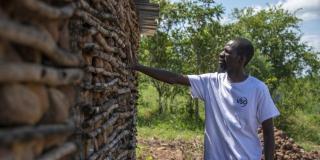
People spent their whole lives building up what Cyclone Idai took in two days.Pity EstajoCommunity volunteer
In March 2019, Cyclone Idai was recorded as one of the worst tropical cyclones to hit Africa and the Southern Hemisphere. The disaster caused a humanitarian crisis in large parts of Mozambique and required a quick response that would support communities that had lost their homes, their livelihoods, and their hope.
Remembering what happened
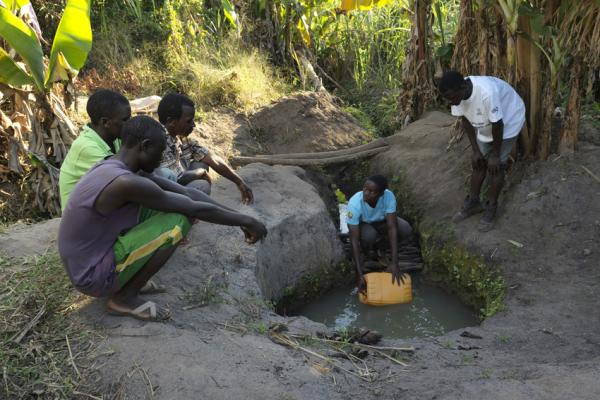
VSO trained Community Volunteers, Chuva and Henriques, showing community members how to purify the water by using chlorophyll after Cyclone Idai.
Pity Estajo was a volunteer working on the ground to help those in need in the aftermath of Cyclone Idai. The people of Mozambique suffered a great deal of consequences following the catastrophic event, with no access to drinking water, electricity, and no communication channels for two entire weeks.
“I spoke to women who were stranded with their children without food or water for days. The stories I heard, the sorrow I felt - it was really scarring." says Pity.
For volunteer Pity, a long-term focus was vital to ensure that communities were protected for years to come. There needed to be more support within the community, so that when events like this occurred again, they would feel more prepared.
“Many organisations provide emergency relief and then leave. This isn’t a bad thing - but what happens when their supplies finish? If you share knowledge, the community will be safe forever. If you share knowledge, that knowledge will pass from generation to generation.”
The people of Mozambique continue to face challenges as a result of the cyclone. Destruction to houses, damage to roads, and the loss of crops have all had a knock-on effect on many areas of their lives. While there have been short-term interventions to deal with urgent issues, it’s clear that long-term solutions are needed to rebuild the community to what it once was.
The delivery of disaster training
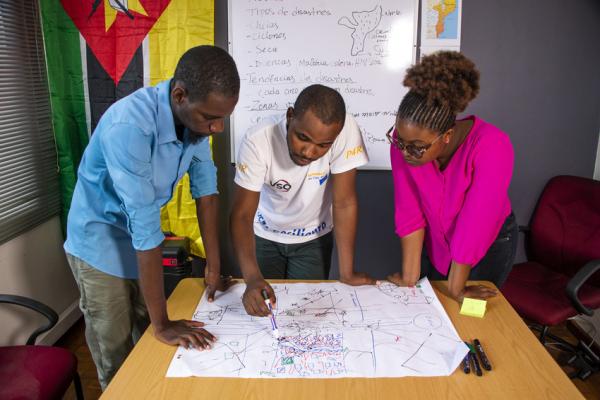
Since the cyclone, volunteers have been helping communities prepare for future disasters by sharing what they’ve learnt through trainings. They've also created community risk assessments and mapped all of the hazards in the community.
VSO volunteers have responded to several disasters over the years. While the devastation never gets any easier, we have been able to develop a strategy that enables communities to be more prepared for when events like this do happen.
Before Cyclone Idai, our team in Mozambique had trained over 750 volunteers in Disaster Response and Preparedness. Through our in-depth workshops, these volunteers have been equipped with the skills needed to actively respond to disasters and support their local communities. By covering areas such as resilience to climate change, water, sanitisation, and hygiene (WASH), as well as life-saving practices, local people feel more prepared when events like this occur in the future.
Work in this area across Mozambique is incredibly important, as the country has been categorised as one of the world’s most vulnerable concerning climate change, being particularly exposed to weather-related hazards. With this in mind, we have continued to provide vital support and have since trained over 1,000 community volunteers in this area.
Tools for preparedness
Today, communities have the confidence to lead the response to disasters. Volunteers have implemented early warning systems for when disasters are inbound meaning that local people can react actively when they strike.
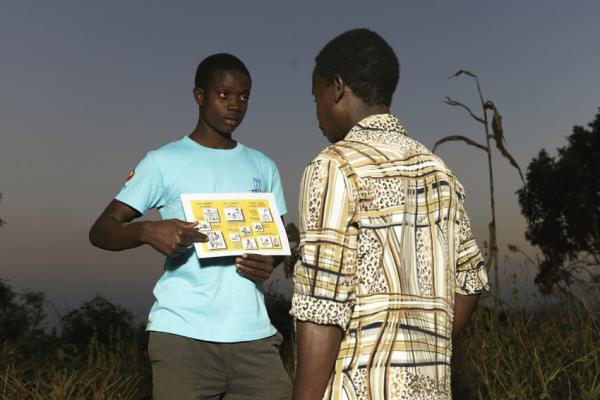
VSO is implementing a resilience programme and it’s working - our communities are more aware now than ever. - Pity
For example coloured flags can be raised to communicate different levels of threat so that local responses can be more tailored. Local governments and other agents can also raise the alert through platforms like WhatsApp.
VSO is helping strengthen these systems in Mozambique with volunteers continuing to build on the training that is currently offered. This will include appointing people to be key representatives in their community and act as team leaders when needed.
The implications of COVID-19
COVID-19 impacted many communities around the world, including those in Mozambique. VSO was able to adapt 80% of its programmes in just 10 days to respond to the crisis and continue reaching the people that needed us most.
In Mozambique, we implemented an awareness raising campaign into the community and were able to reach 13,000 people through that. Our volunteers weren’t able to go out in the community physically and offer training like before, but were able to look at new ways of communicating such as radios.
Through radio, volunteers were able to continue building on the skills they were supporting when working in the field. This included everything from disaster response to making face coverings and what preventable measures could help protect them from the virus.
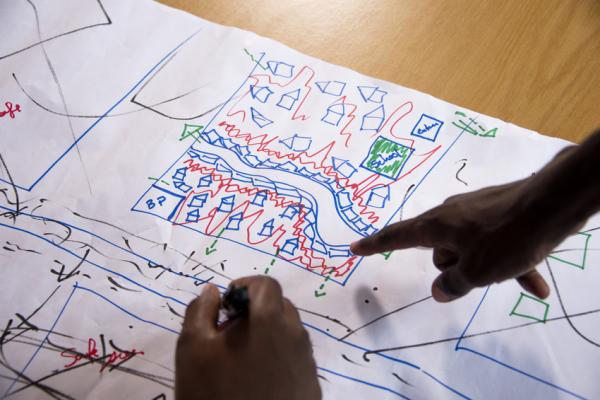
Notes from the field: Rassul Nassigo
Rassul Nassigo, who is a Disaster Risk Reduction and Resillience National Volunteer, has said that since the work began the community has been incredibly receptive. He has been actively working with the most marganlised and vulnerable communities who are often considered unreachable, and providing them with the right information so they can stay safe.
“Sometimes we go on foot 7km to reach these communities when offering training. They often don’t have access to education or healthcare, so providing this information has been incredibly rewarding. They are sometimes the most impacted by disasters like Cyclone Idai, and didn’t know that where they were living was unsafe, but with this knowledge, they have now been able to make more informed decisions to protect their loved ones.”
It’s clear that volunteers, along with the support of the communities they work in, are playing a critical role in building back better.
“You need passion for what you are going to do. There needs to be commitment. This is key to achieve the change in the community. Communities expect something from us, and we expect things from the community.”
Following the events of Cyclone Idai, we ran an emergency fundraising appeal to ensure we were able to support communities on the ground. At the time, over 6,000 houses and 18 hospitals were destroyed in Mozambique alone, along with many schools. Because of your generosity, we were able to raise £127,196 to assist the disaster relief efforts directly.
Both our staff and volunteers were involved in the immediate relief effort, helping load and distribute emergency supplies to some of the worst affected areas. The above testimonies show the impact a donation like yours can have. VSO's work does continue in this area so that communities across the world can feel more prepared should an event like this happen again.
Donate today
Your donation can help us to continue to support people in Mozambique to strengthen response systems. While the devastation never gets any easier, your donation can help communities to be more prepared for when events like this happen.
Read more

The two volunteers empowering girls and young women in Mozambique
Nelma and Carmirene and are two volunteers working on VSO's EAGLE project in Mozambique. For Nelma and Carmirene, education is not just about school, it is about meeting people where they are and using the right tools to challenging harmful norms. Here are their stories.
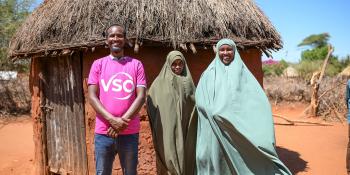
A ripple of change: how VSO volunteers are transforming communities
Every act of volunteering begins with a choice — a decision to act out of a desire to make a difference. Across the world, VSO volunteers are proving that one spark of action can ignite something much bigger.
Opening doors to safety, education, and a brighter future
For girls in Karamoja, the poorest region in Uganda, being forced into early motherhood is all too common. You can open the doors to safety, education, and a brighter future.
